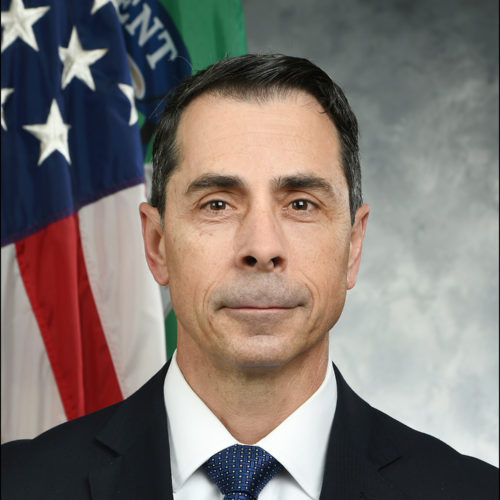In a keynote at the ACAMS virtual annual conference, FinCEN Director Kenneth Blanco said the agency is focused on the pandemic's impact on financial threats
Before the COVID-19 pandemic hit, the federal government’s Financial Crimes Enforcement Network (FinCEN) already had its collective hands full investigating cyber-crime, identity theft, drug trafficking, human trafficking, terrorist financing, international corruption, and a host of other threats to our nation’s financial security.
When the pandemic hit, the $2.2 trillion Coronavirus, Aid, Relief, and Economic Security (CARES) Act and the Paycheck Protection Program (PPP) motivated fraudsters everywhere to start getting creative. Websites sprang up selling counterfeit personal protective equipment (PPE), bogus COVID-19 test kits, and miracle coronavirus “vaccines”; illicit shell companies applied for business loans; bogus unemployment applications were filed; and fake Covid-19 charities sought donations. These and many other scams intended to exploit weaknesses in the government’s stimulus response were suddenly sprouting like evil electronic mushrooms.
“We all had to pivot, and quickly,” said Kenneth Blanco in a keynote address Tuesday to members of the Association of Certified Money-Laundering Specialists (ACAMS), which is holding its annual conference virtually this week. “We have an incredibly important mission, one that profoundly affects people’s lives, and we cannot stop in the face of crises or challenges,” Blanco declared. He also assured ACAMS members that “[FinCEN] remains laser-focused on the effects COVID-19 has had on a range of illicit financial threats across the world.”
So many SARs
With a FY2019 budget of $115 million and only 332 agents, however, there is only so much FinCEN can do. To fulfill its mandate, FinCEN needs help, Blanco said, especially from the community of Bank Secrecy Act (BSA) and anti-money laundering (AML) compliance professionals.
“Fraudsters use cyber-platforms such as the dark web, social media, and email to recruit money mules, obtain fraudulent beneficiary information, and share government program information,” Blanco explained. To prevent those criminals from funneling illegally obtained funds through the nation’s financial system, FinCEN relies heavily on Suspicious Activity Reports (SARs), which bank employees and BSA/AML compliance officers are required to file whenever they notice suspicious financial activity.

According to Blanco, between Feb. 1 to Sept. 20 (the height of the pandemic crisis), financial institutions filed 91,000 SARs referencing COVID-19 stimulus programs. It is FinCEN’s responsibility to analyze SARs, weed out non-criminal reports, and refer the most suspicious transaction activity to relevant law-enforcement agencies. In many ways, however, FinCEN’s biggest enemy is lack of resources — which is why Blanco practically pleaded with his audience to be more thorough and accurate in its SARs filings.
“If your SARs address fraud against any COVID-19 government stimulus program or the CARES Act, please be as specific as possible in naming the program when you file your SAR to expedite getting it to the right investigative team,” Blanco said. “Vague references to ‘stimulus’ or ‘CARES Act’ or ‘benefit’ in SARs hinder our ability to get the information into the hands of the right team.”
Reports & reforms
Blanco did not mention the 800-pound gorilla in this particular room — a recent Buzzfeed News investigative report based on more than 2,000 leaked SARs reports from the past 20 years, alleging that many of the world’s largest banks have been laundering trillions of dollars through the international banking system, and no one is stopping them. That’s FinCEN’s job, of course, so it’s an understandably touchy subject for Blanco. In fact, the agency’s only official response to the report so far has been to point out that “unauthorized disclosure of SARs is a crime,” and that the matter has been referred to the U.S. Department of Justice and the U.S. Treasury’s Inspector General.
Nothing in the Buzzfeed report can possibly be news to Blanco, however. And to its credit, FinCEN has issued guidance and initiated several reforms in response to COVID-19, the most recent of which is finalization of the so-called “Gap Rule.” This rule tightens AML standards on private banks, non-federally-insured state banks and credit unions, and other less prominent financial entities that fraudsters often target because of their relatively lax regulatory oversight.
On Sept. 17, FinCEN also issued an Advanced Notice of Proposed Rulemaking (ANPRM) to initiate what Blanco called a “national conversation” on effective ways to reform many aspects of the relationship between FinCEN and financial institutions. Blanco invited all BSA/AML professionals to participate, and emphasized how important strong private/public partnerships are to effective government. “With this ANPRM, we are issuing a meaningful, public invitation to all of you to weigh in, provide your perspectives, your experience, and your insights,” he said, adding that “these things are not easy.”
ILLICIT CASH Act
With any luck, Blanco may one day get some additional help from passage of the ILLICIT CASH Act (ICA), a bi-partisan bill currently wending its way through Congress that proposes much-needed reforms to AML procedures which haven’t been updated since the Bank Secrecy Act was passed in 1970. ILLICIT CASH stands for (take a breath): Improving Laundering Laws and Increasing Comprehensive Information Tracking Criminal Activity in Shell Holdings Act. Aside from being one of the most tortuous legislative acronyms of all time, the bill represents a significant step forward in the world of BSA/AML compliance.
In a separate ACAMS session, Sen. Mark Warner (D-Va.) emphasized that passage of the ICA was important because, among other things, it provides more funding and resources for FinCEN, which he acknowledged was “under-resourced and under-staffed.” According to Warner, the ICA will also help re-establish America’s leadership in the all-important realms of digital and financial security.
“I am concerned that we are giving up our technology standards leadership,” Warner said, noting that when it comes to digital privacy standards “we have defaulted to the Europeans, which I think is a mistake. In America, it’s hard to chastise our neighbors when we don’t have a good regime in the first place.”







